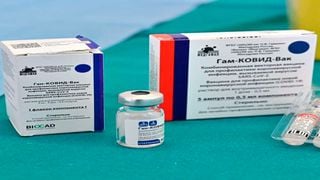Breaking News: Former Lugari MP Cyrus Jirongo dies in a road crash

The Russian Sputnik V Covid-19 vaccine, during a vaccination campain at the State Hospital in Cailungo, San Marino, on March 29, 2021.
| Andreas Solaro | AFPNews
Premium
Russia’s Sputnik V vaccine to be shipped out
What you need to know:
- Pharmacy Board says the remaining doses must be re-exported.
- 228 Kenyans have received the banned jab.
The State drugs regulator has said the entire consignment of the banned Russian Covid-19 vaccine must be shipped out of the country unless the Health ministry grants special exemptions.
In yet another twist to debate on how 228 Kenyans will access a second dose of the Sputnik V vaccine, the Pharmacy and Poisons Board (PPB) has said it would require authority, in writing, from the ministry for any quantities of the drug to be retained.
In the absence of such approval, the supplier must export the remaining doses of the vaccine whose administration was banned by Kenyan authorities with 75,000 doses already in the country.
“As it stands, we are re-exporting everything that remained after the first dose was given unless we get a letter from the Ministry of Health on the number of doses to retain,” said a PPB officer.
“Even a single dose is not going to remain in the country. The ban on administration means that nothing should be left behind and that is what we are doing. As a regulator, we only do the necessary when advised. Otherwise things might work against us in future,” he added.
Re-export the vaccine
A senior officer at PPB told Nation the importers have since applied online to re-export the vaccine. However, they will not be cleared unless they reconcile the quantities.
The official explained the importers have to collect all the doses that had been dispatched to different facilities including the ones taken to Kenya Medical Research Institute for testing to reconcile figures with the used ones.
Dinlas Pharma EPZ Limited imported 75,000 doses of Sputnik V vaccine on March 22 and according to the government chanjo portal, only 228 doses have since been administered.
Kenyans who opted for the drug are expected to be vaccinated with the second dose after 21 days.
The latest controversy casts doubts on whether those who got the Russian vaccine are guaranteed the second dose.
Restrictions on exports
The Centers for Disease Control and Prevention (CDC) explains that for a vaccine to be effective, one needs the two doses.
Though there has been limited research into how a single shot of a two series vaccine can protect one's immunity, Dr Fauci Anthony, the director of the U.S. National Institute of Allergy and Infectious Diseases, said that receiving one shot won't cause any residual side effects in one's immune system.
“Even with one dose, one is protected but not strong protection. But you need to ask yourself for how long the immunity is going to last,” Dr Fauci said.
Kenya, which has sanctioned the AstraZeneca vaccine, is at a crossroads as India, which is supplying the drugs has imposed restrictions on exports.
New Delhi has blocked export of the AstraZeneca vaccine to due to surging domestic demand.
India is currently witnessing a resurgence of infections and, as of yesterday, there were over 220,000 new active cases, which were steadily rising.
Local supply shortage
Kenya could also fail to meet its vaccination target of 3.2 million jabs by June, as global and local supply shortage, registration confusion, and reluctance among some priority groups rock the campaign.
The country’s vaccine stocks are also expected to run out in 10 days.
The Ministry had earlier indicated that it will rely on the Covax facility and Africa CDC. Kenya, and a host of other low and middle-income countries, depend on the United Nations-backed Covax facility, a multi-organisation global initiative to access Covid-19 vaccines.
Covax is the biggest customer of the Serum Institute of India, the world’s largest vaccine manufacturer. India, last week ordered 100 million doses of the Oxford/AstraZeneca vaccine from the institute, taking all the doses the company will produce, and effectively locking out any exports.
Kenya is among 192 others signed up to Covax which aims to supply doses for at least 20 percent of national populations. Kenya was to receive 3.6 million doses of the AZ vaccine between February and May. The first shipment of 1.2 million doses was delivered in March.





